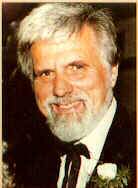NICE KINESIOLOGIE
RESEARCH ISSUES
by Touch For Health's 'Mentor', JOHN THIE
First part
HOW DO WE PROVE THAT WHAT WE ARE TEACHING IS VALID?
There are two world views that dominate the world today and both have validity in the areas they address.
Our world view is that we are intelligently designed and that each person is unique and was designed for a purpose that belongs uniquely to that person. We also believe that the authority about how the individual person is performing resides in that person, not outside in any external authority other than God.
Our purpose in TFH and the sharing of the TFH methods with others, is to allow more and more people to be able to fulfil their unique purpose.
With this world view of proving to others that what we do is valid, we run into trouble. The second common world view is the mechanistic view. In the research of these methods we have to have a control group vs. the intervention group.
Recruiting people that wanted to have touch interventions and knowing that they might not be in the intervention group was impossible for us. The other criteria made it even more impossible, ie. to have no one know who was receiving the intervention and who was having the control procedures. Even if this was possible, we have another problem.
We believe there is no separation between the body and the mind, and the mind of the person doing the intervention enters into the intervention as well as the body participation in the intervention.
If we believe that what we do is effective, and therefore the control group would not be receiving an effective treatment, would our thoughts and intentions that believed that the control would therefore not be effective cause a negative placebo effect?
This then produced a serious ethical problem for us. We could not consider causing people having problems to be made worse or effected negatively. This then ruled out the materialistic methodology of blind, double blind and triple blind research studies.
Our research is based on outcomes of interventions. We desire to gather these and we may be able to understand ways that research could be done that will compare our interventions with no intervention in retrospective and prospective studies. We must be aware "that the great majority of treatment / interventions have no scientific evidence of effectiveness."
Eddy in the USA and Rachlis and Kushner in Canada, conclude that 85% of all medical technologies and treatments are NOT supported by scientific evidence.
Chiropractic reports states "Given this knowledge, the mood of patients and third party payers is changing - they do not assume treatment will be beneficial with the level of blind trust they once had. They have choices. Consumers are becoming more informed and demand higher quality of care and value for money..."
We are urging TFH instructors to gather anecdotal reports of the outcomes of the use of TFH by individuals and groups to report and publish these findings.

Second part
OUTCOME MANAGEMENT, ASSESSMENT AND REPORTING IS THE PROCESS OF:
• Accurate assessment of the impact of care on the patients / students / clients.• Analyzing that information to see which providers / educators and procedures are actually effective and cost effective.
• Substituting and using the services shown to have the best outcomes assessment...
• Practical benefits of better outcomes assessment include : - documentation of improvement to the student, the patient and third parties. The justification of the need for the information and/or medical model treatments and the frequency of sessions, interventions, or treatments to transfer the information or assist the person in corrections of malfunctions or deficiencies.
• Help in deciding when maximum intervention improvement has been reached. Working with a goal in order to have some way of measuring when the goal has been reached.
• Help in discovering when the goal is not motivational for the patient / student / client so that the changes in lifestyle and conditions are being met so that the goal may be achieved.
• Developing a database for clinical research, so that consistent evaluation of the effects of the TFH over a period of time.
• Assistance in establishing practice guidelines for specific students / patients / clients for specific goals.
Until recently, authority figure measurements have been considered "hard" evidence of outcomes such as changes in lab tests. X-Rays range of motion tests, and strength as measured on machines. Patient reports of symptoms, behavior and satisfaction have been regarded as subjective, less reliable and "soft" evidence.
With the increased use of inter examiner reliability tests, this differentiation is blurred and, if anything, the patient reports are now considered better data and more reproducible.
The changes in the patient / student / client to the maximum improvements is our goal and we believe along with the new research that the best evidence is the patient / client / student / self reports of improvement in performance.
You, the new trainer of instructors of Touch For Health, have a lot of responsibilities because of the knowledge you are receiving. You can really make a difference in making our world a better place. Your loving your students will allow you to have a very satisfying life as a trainer of people who teach and use the Touch For Health methods for health enhancement and general improved performance.
May God direct you moment by moment.
JOHN F. THIE, D.C.
